

What is Global Citizenship Education?
According to the Global Citizenship Foundation, Global Citizenship Education (GCED) can be defined as a transformative, lifelong pursuit that involves both curricular learning and practical experience to shape a mindset to care for humanity and the planet, and to equip individuals with global competencies to undertake responsible actions aimed at forging more just, peaceful, secure, sustainable, tolerant and inclusive societies. GCED is an approach to education that helps individuals to develop the skills, knowledge and values they need to become active, responsible, and responsive citizens who contribute to building more peaceful, just and sustainable societies.
What are the Conceptual Dimensions of Global Citizenship Education?
According to the UNESCO , Global Citizenship Education covers three conceptual dimensions or domains of learning:
- Knowledge (Cognitive)
- Socio-Emotional (Affective)
- Behavioral (Psychomotor)
It is important for educators to understand all three dimensions in order to create a holistic learning experience for their students. The knowledge or cognitive dimension of GCED focuses on developing knowledge about global citizenship, such as understanding human rights, social justice, and sustainable development. The socio-emotional learning or affective dimension focuses on developing positive attitudes and values related to global citizenship, such as respect for diversity, empathy, and solidarity. The behavioral or psychomotor dimension focuses on developing the skills and competencies needed to take action as a global citizen, such as critical thinking, problem solving, and effective communication.
How can you become a global citizen?
A Global Citizen is someone who is open-minded, curious, compassionate, collaborative, co-creative, inclusive, non-discriminatory, responsible, reflective, and well-informed individual. To be a global citizen it is not necessary travel to different countries or know multiple languages. Becoming a global citizen is a lifelong learning process that requires continuous reflection of our perspectives. To become a global citizen means one is a life-long learner ready to learn, unlearn, and relearn. A global citizen is someone who is aware and acknowledges the multiple concentric identities that transcend geographical or political boundaries and takes action towards human and planetary flourishing. One can be and become a Global Citizen even without traveling to other country or speaking another language. Global Citizenship is all about our mindsets and our actions. To become a global citizen one needs to develop empathy, compassion, mindfulness, and critical inquiry towards issues, challenges, conflicts involving other human beings. A Global Citizen neither has a passport or official status but becomes part of this broader membership, simply by taking an active and reflective actions in their communities towards shaping a more inclusive, just, equitable, peaceful, secure, sustainable world for all.
Why teach Global Citizenship Education?
The world as we know it today is marred with conflicts, challenges, catastrophes, and crises that need our immediate attention. Climate change, poverty, illiteracy, hunger, violent extremism, and xenophobia are but a few of the many issues that the world continues to grapple with, even today. Global citizenship is a call to action — for people to come together in realizing their role and shared responsibilities of protecting the planet, fostering peace, ensuring global prosperity, respecting diversity, and advancing humanity through partnerships. We believe there is no global without local and as Mahatma Gandhi said ‘If you want to change the world, start with yourself.’ Global Citizenship Education provides a lens to view issues and challenges through, what we at the Global Citizenship Foundation call as “Two-Systems Thinking”. Where you “Think and Act, both global and local” instead of just “Thinking Global and Acting Local”. Global Citizenship Education aims to instill in learners the values, attitudes and behaviors that support responsible global citizenship.
Our Case for Global Citizenship Education
The concept of Global Citizenship is an old idea, and global leaders, educators, and practitioners recognize that the concept of Global Citizenship is relevant today more than ever. Global Citizenship Education inspires and empowers individuals to:
- Reflect on their biases and assumptions
- Value diversity and inclusion
- Develop a greater understanding of countries, communities, and cultures around the world; events shaping our world
- Explore questions about democracy, justice, inequality, governance, sustainability, and organization
- Learn to work together to create solutions that try to address local, national, and global challenges
- Enhance knowledge, skills, and competencies to make positive contributions to society as informed and responsible global citizens
- Take Action towards achieving a more just, inclusive, peaceful, prosperous, secure, and sustainable world for all
- Realize one’s capacity for change and the ability to take one’s place as responsible global citizens
As a result, Global Citizenship Education also prevents generations from the scourge of hate, radicalization, extremism, and violence. Thereby, inspiring learners to be part of the solution to the problems faced across the planet.
Impetus on Global Education
The Education 2030 Agenda and Framework for Action , notably Target 4.7 of the Sustainable Development Goal 4: Quality Education , mandates the fostering of Education for Global Citizenship by calling on countries to “e nsure that all learners are provided with the knowledge and skills to promote sustainable development, including, among others, through education for sustainable development and sustainable lifestyles, human rights, gender equality, promotion of a culture of peace and non-violence, global citizenship and appreciation of cultural diversity and of culture’s contribution to sustainable development ”.
Importance of SDG 4.7
Target 4.7 of the United Nations’ Sustainable Development Goal 4 intends to realize the social, humanistic and moral purposes of education.Target 4.7 is a passport to ensuring Quality Education, preparing young people for life. It explicitly links education to other SDGs and captures the transformative aspirations of the Agenda 2030 for Sustainable Development.
Role of Educational Institutions in Fulfilling the United Nations' Sustainable Development Goal 4 and Target 4.7
The concept of global citizenship is embedded in the Sustainable Development Goals through SDG 4: Ensuring Inclusive and Quality Education for All and Promote Life Long Learning, which includes global citizenship as one of its targets. By 2030, the international community has agreed to ensure that all learners acquire the knowledge and skills needed to promote sustainable development, including global citizenship. Educational Institutions have a responsibility to promote global citizenship by fostering in educators and learners that they are members of both their local and larger global community and can use their skills and education to contribute towards these communities.
Our Whole-Child GCED Framework
The Framework that guides us in fostering Global Citizenship Education in formal and non formal education systems include:
- Sustainable Development Goals
- Social-Emotional Learning
- Libré Pedagogy
- DEED Approach to Teaching and Learning
- Core themes of Global Citizenship Education
- GCED Innovative Mindset and GCED School Code for holistic imprementation strategy
The maxim "Think Global, Act Local" perhaps best suits the last century. This century demands that we develop two-systems thinking. That is to "Think and Act Both Local and Global." — Aaryan Salman, President, Global Citizenship Foundation
Global Citizenship is Inspired by Ancient Wisdom
The philosophy of global citizenship across cultures and civilizations…
African Philosophy
umuntu ngumuntu ngabantu (In Zulu Language)
Ubuntu is an ancient African word meaning "humanity towards others" or "I am because of who we all are" .
Indian Philosophy
अयं निज: परो वेति गणना लघुचेतसाम् । उदारचरितानां तु वसुधैव कुटुम्बकम् ॥ —Hitopadesha: 1.3.71
Transliteration: "Ayam nijaH paro veti gaNanaa laghuchetasaam udaaracharitaam tu vasudhaiva kutumbakam" Translation: The thought that one person is related to me and another is not is that of the narrow-minded. For the broadminded, however, the whole world is one family.
仁 (Ren: “two-man-mindedness”) —Analects of Confucius
Definition: “Wishing to be established oneself, seeks also to establish others; wishing to be enlarged oneself, seeks also to enlarge others.” Relationship between two humans: humanity, benevolence
South American Philosophy
sumak kawsay (In Quechua Language)
In Quechua Sumak Kawsay roughly translates into “good living” or the “good life,” however it means much deeper than this. Throughout South America, it is a way of living in harmony within communities, ourselves, and most importantly, nature.
"I am not an Athenian or a Greek, but a citizen of the world." —Plutarch, Of Banishment
Throughout the history of humankind, many people including Socrates declared to be citizens of the Earth.
.png)
The Global Citizenship Foundation is a registered not-for-profit specialist organization with a mandate to foster active global citizenship and Global Citizenship Education (GCED). The seats of the Global Citizenship Foundation are Tallinn, Estonia in the European Union and the National Capital Territory of Delhi in India.
Copyright 2022 © Global Citizenship Foundation. Except where otherwise noted, resource content on this site is licensed under a Creative Commons Attribution-NonCommercial-ShareAlike 4.0 International license.
Website Maintained by Office of Digital Communications, Global Citizenship Foundation
This site belongs to UNESCO's International Institute for Educational Planning

IIEP Learning Portal

Search form
Global citizenship education.
Global Citizenship Education (GCED) aims to empower learners of all ages to assume active roles, both locally and globally, in building more peaceful, tolerant, inclusive and secure societies. GCED is based on the three domains of learning - cognitive, socio-emotional and behavioural: Cognitive: knowledge and thinking skills necessary to better understand the world and its complexities; Socio-emotional: values, attitudes and social skills that enable learners to develop affectively, psychosocially, and physically and to enable them to live together with others respectfully and peacefully; Behavioural: conduct, performance, practical application and engagement. The key learning outcomes, key learner attributes, topics and learning objectives suggested in GCED are based on the three domains of learning mentioned above. They are interlinked and integrated into the learning process.
UNESCO website
By 2030, ensure that all learners acquire knowledge and skills needed to promote sustainable development, including, among others, through education for sustainable development and sustainable lifestyles, human rights, gender equality, promotion of a culture of peace and non-violence, global citizenship and appreciation of cultural diversity and of culture’s contribution to sustainable development ( UNESCO, 2016: 48).
UNESCO.2016. Education 2030: Incheon Declaration and Framework for Action for the Implementation of Sustainable Development Goal 4: Ensure Inclusive and Equitable Quality Education and Promote Lifelong Learning opportunities for all . Paris: UNESCO.

Search the United Nations
- UNAI Principles
- Map of UNAI Members
- List of UNAI Members
- Special Series
- Select UN Events
- UNAI Events
- SDGs Best Practices
- SDGs Guidelines
- SDGs Training Sessions
- SDGs Workshops
- The Why Join Guide
- Tools for Researchers
- Bulletin Board
- Submit the 2024 Activity Report
- Become a Millennium Fellow
- UNAI Voices
- Sustainable Development Goals
- UN Agencies
- UN Information Centres
- Dag Hammarskjöld Library
- UN Stories Archive
- UN Publications
- Internships
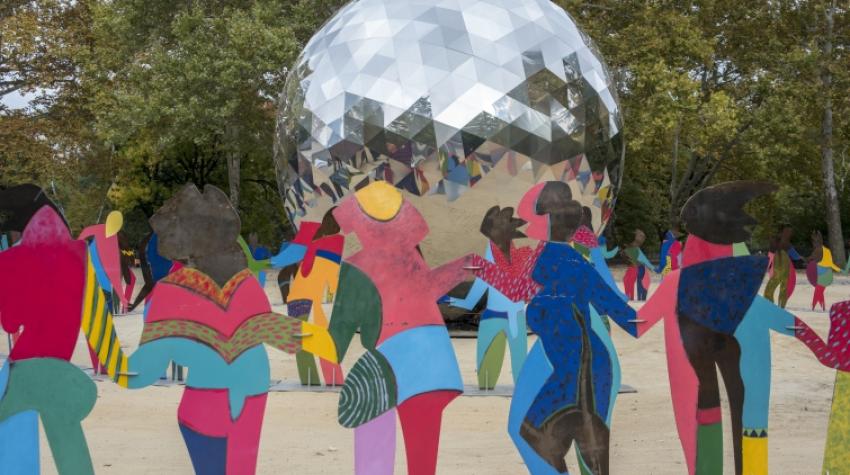
Global Citizenship
Global citizenship is the umbrella term for social, political, environmental, and economic actions of globally minded individuals and communities on a worldwide scale. The term can refer to the belief that individuals are members of multiple, diverse, local and non-local networks rather than single actors affecting isolated societies. Promoting global citizenship in sustainable development will allow individuals to embrace their social responsibility to act for the benefit of all societies, not just their own.
The concept of global citizenship is embedded in the Sustainable Development Goals though SDG 4: Insuring Inclusive and Quality Education for All and Promote Life Long Learning, which includes global citizenship as one of its targets. By 2030, the international community has agreed to ensure that all learners acquire the knowledge and skills needed to promote sustainable development, including global citizenship. Universities have a responsibility to promote global citizenship by teaching their students that they are members of a large global community and can use their skills and education to contribute to that community.
About the Hub: Ana G. Méndez University (UAGM) is a private non-profit higher education institution founded over seven decades ago in Puerto Rico. UAGM provides quality education and promotes research with a vision of innovation and entrepreneurship. Through its three main campuses (Gurabo, Cupey, and Carolina) and eight off-campus centers located around the island, UAGM offers a variety of academic programs in different modalities and excellent services designed to fulfill the needs and expectations of a diverse student population. UAGM is the global center of UNAI to promote the exchange of knowledge and information regarding global citizenship. Its activities in this theme solidify its commitment to the development of global citizens by ensuring that its graduates are fully prepared to assume leadership roles and present solutions to humanity's challenges and needs.
Ana G. Mendez University
UNITED NATIONS
- Universal Declaration of Human Rights
TAKE ACTION
- Lazy Person's Guide
- UN Volunteers
- Youth Engagement
- Past Contests and Scholarships
- Request a Speaker
- Visit the UN
NEWS AND MEDIA
- UN News Centre
- Press Releases
- Office of the Spokesperson
- UN in Action
- UN Social Media
- The Essential UN
ISSUES AND CAMPAIGNS
- SDG of the Month
- Observances and Commemorations
- Celebrity Advocates for the UN
Measuring global citizenship education
- Download the full report
Subscribe to the Center for Universal Education Bulletin
A collection of practices and tools, kate anderson and ka kate anderson former brookings expert jasodhara bhattacharya jb jasodhara bhattacharya policy analyst - center for universal education.
April 11, 2017
The idea of global citizenship has existed for several millennia. In ancient Greece, Diogenes declared himself a citizen of the world, 1 while the Mahaupanishads of ancient India spoke of the world as one family. 2 Today, education for global citizenship is recognized in many countries as a strategy for helping children and youth prosper in their personal and professional lives and contribute to building a better world. This toolkit is intended to shed light on one aspect of operationalizing global citizenship education (GCED): how it can be measured.
This toolkit is the result of the collective efforts of the Global Citizenship Education Working Group (GCED-WG), a collegium of 90 organizations and experts co-convened by the United Nations Educational, Scientific, and Cultural Organization (UNESCO), the Center for Universal Education (CUE) at the Brookings Institution, and the United Nations Secretary General’s Global Education First Initiative’s Youth Advocacy Group (GEFI-YAG). To gather the measurement tools in this collection, the working group surveyed GCED programs and initiatives that target youth (ages 15–24). 3 For the purposes of this project, GCED was defined as any educational effort that aims to provide the skills, knowledge, and experiences and to encourage the behaviors, attitudes, and values that allow young persons to be agents of long-term, positive changes in their own lives and in the lives of people in their immediate and larger communities (with the community including the environment).
This toolkit begins with a brief review of opinions on why GCED is important and the variety of definitions of GCED. We follow the report with a catalog of 50 profiles of assessment efforts, each describing practices and tools to measure GCED at the classroom, local, and national levels. Note that the survey does not represent an exhaustive list but may be regarded as a living document that will grow as the field of GCED itself grows around the world.
Broadly speaking, the assessment efforts in this survey may be categorized across achieving three goals: (1) fostering the values/attitudes of being an agent of positive change; (2) building knowledge of where, why, and how to take action toward positive change; and (3) developing self-efficacy for taking effective actions toward positive change.
Today, global challenges such as climate change, migration, and conflict will require people to do more than just think about solutions. They will require effective action, by both individuals and communities. Education for global citizenship is one means to help young people develop the knowledge, skills, behaviors, attitudes, and values to engage in effective individual and collective action at their local levels, with an eye toward a long-term, better future at the global level. We offer this toolkit to provide guidance for educators, policymakers, non-governmental organizations, civil society, and researchers, and to inform this conversation.
download the full report »
Related Content
Allison Anderson, David Crone
May 7, 2014
Kate Anderson, Rebecca Winthrop
April 15, 2014
Allison Anderson
January 30, 2013
- Laertius, D. (1853). The lives and opinions of eminent philosophers (Vol. 43). London: HG Bohn.
- Deussen, P. (1980). Sixty Upanishads of the Veda,2 vols. Translated from German by V.M. Bedekarand G.B. Palsule (Delhi: Motilal Banarsidass).
- For the UN definition of youth, see the followingonline document: http://www.un.org/esa/socdev/documents/youth/fact-sheets/youth-definition.pdf
Global Education
Global Economy and Development
Center for Universal Education
Thinley Choden
May 3, 2024
Ghulam Omar Qargha, Rachel Dyl, Sreehari Ravindranath, Nariman Moustafa, Erika Faz de la Paz
Kathy Hirsh-Pasek, Rebecca Winthrop, Sweta Shah
May 2, 2024
- Our work with schools
- What is global citizenship?
- Global citizenship guides
- Support for educators
Tim Fransham/Oxfam
Oxfam education
Ideas, resources and support for active global citizenship in the classroom and beyond.
What is Global Citizenship?
Global citizenship is the term for social, environmental, and economic actions of individuals and communities who recognise that every person is a citizen of the world.
It is about how decisions in one part of the planet can affect people living in a different part of it, and about how we all share a common humanity and are of equal worth.
It means being open to engaging positively with other identities and cultures and being able to recognise and challenge stereotypes.
It is also about how we use and share the earth's resources fairly and uphold the human rights of all.
What does it mean to be a global citizen?
A global citizen is someone who is aware of and understands the wider world – and their place in it. They are a citizen of the world. They take an active role in their community and work with others to make our planet more peaceful, sustainable and fairer.
Examples of global citizenship
Global citizenship involves...
- Exploring local and global connections and our views, values and assumptions
- Exploring issues of social justice locally and globally
- Exploring the complexity of global issues and engaging with multiple perspectives
- Applying learning to real-world issues and contexts
- Opportunities to make informed, reflective action and be heard
GLOBAL CITIZENSHIP EDUCATION
For Oxfam, global citizenship is all about encouraging young people to develop the knowledge, skills and values they need to engage with the world. And it's about the belief that we can all make a difference.
Education for global citizenship isn't an additional subject – it's a framework for learning, reaching beyond school to the wider community. It can be promoted in class through the existing curriculum or through new initiatives and activities.
BENEFITS OF GLOBAL CITIZENSHIP
Global citizenship helps young people to:
- Build their own understanding of world events.
- Think about their values and what's important to them.
- Take learning into the real world.
- Challenge ignorance and intolerance.
- Get involved in their local, national and global communities.
- Develop an argument and voice their opinions.
- See that they have power to act and influence the world around them.
What's more, global citizenship inspires and informs teachers and parents, too. But above all, it shows young people that they have a voice. The world may be changing fast, but they can make a positive difference – and help build a fairer, safer and more secure world for everyone.
Jo-Anne Witcombe/ Oxfam

Teaching resources
Ideas, activities and support for developing global learning in the classroom and beyond.
Salahuddin Ahmed
Practical advice and inspiration for embedding global citizenship in the curriculum and across the whole school.
Active global citizenship
Beyond the classroom, we give young people lots of ways to take action for a better world.
Discover More
Home learning activities.
Global learning at home, in the classroom or wherever you are!
Schools Speak Out
Support young people to demonstrate leadership, take part in our latest campaigns and speak out about global poverty.
Also in this section
- Apprenticeships
- South Africa
- Tuition & Aid
- Eligibility Quiz
- Request Info
- Alumni Stories
- Community Hub
- News & Press
- For Educators
What is Global Citizenship?
Connection across cultures is a crucial component in fostering empathy on a global scale. As such, broadening one’s horizons and stepping out of your own experience is essential in order to develop empathy for others.
One way to achieve this goal is by diving head first into global citizenship. But what is global citizenship? What is a global citizen? And how do you become a global citizen? Let’s look into the answers to these questions, as well as some of the ways in which you can expand your global citizenship education.
GLOBAL CITIZENSHIP
Global citizenship: what is it and how to become one.
Global Citizenship Definition
While it may mean different things to different people, the most common global citizenship definition is the idea that all people have civic responsibilities to the world as a whole, rather than just their local communities or countries. So, by expanding one’s personal horizons through global learning, you are able to effect change in a more meaningful sense on both a small and larger scale.
What does it mean to be a global citizen and how do you become one?
Global citizenship is more than a title — it’s a mindset. In the emerging digital world, the international community is getting closer and closer, yet if one chooses not to act, it’s easy to stay in a bubble. Ask yourself — what communities am I a part of? Your answers could include your home, school, work, or literal neighborhood — expanding that into the world community strengthens your global citizenship. In these “small” communities, you might exchange ideas with a friend or help out a coworker with a problem. Being a global citizen simply means having a willingness to do this with people from different nations and cultural backgrounds.
You may feel like you don’t have enough to offer. It’s tempting to think you have to travel to a new country every month or fight for social justice to define yourself as a “global citizen.” This misses the mark. The global citizen definition you should use is more about being connected and garnering an understanding of cultures beyond your own. This looks different for different people. What does it mean to be a global citizen for you? It could start with something as simple as researching a new country or making friends with an immigrant neighbor. It could end with traveling abroad and contributing to community efforts to advance education, health, or environmental conservation. Working to solve our shared global challenges is so important, and this drive to make a positive impact is most effective when it stems from the feeling of global citizenship and being a member of an international community.
How to Become a Global Citizen and Improve Your Global Citizenship Skills
When people make the decision to become global citizens, they have already made a step in the right direction towards expanding their global awareness, but there are some things — both small and large — that you personally can do to create global citizenship in your own life. Here are just a few.
Learn About the World
Even before you hop into international travel, there are ways in which you can learn about the world and become a global citizen. The internet is a wonderful resource that can help you do this.
One way to become more globally aware is by reading about different cultures and experiences. By reading blogs, articles, and books from people who live in other parts of the world, you can gain a deeper understanding of their lives and perspectives.
Another way to improve your global citizenship is by connecting with people from different countries and cultures online. You can seek out social media accounts of people from different countries and start conversations with them. You could also become an online tutor to young international students, helping them to learn your language and culture while learning from theirs.
By doing these things, you can get close to people from different cultural backgrounds and learn about the issues they face regularly. This can help you to explore things outside of your regular purview and become a more informed and compassionate global citizen.
One of the best ways to grow your global citizenship and become a citizen of the world is, naturally, to get out and go see it. Traveling to other countries can provide you with invaluable experience and education through interacting with other cultures. Transformative life lessons are often borne of these kinds of travel experiences, allowing you to learn about topics like global health, interdependence, diversity, social justice, and more through your lived experiences while abroad. That is why at Global Citizen Year, our Take Action Lab program provides an immersive gap semester abroad while learning from experienced human rights advocates advancing social justice.
Learn About Yourself
Being a part of any community involves giving and receiving. As you learn about the world, you should see some mindsets change, and you may discover new interests and causes to explore. Are you passionate about social or political involvement? Do you wish you could alleviate climate change? Do you have the skills to teach English online or help on an organic farm? Knowing what you care about and what you want to offer to the world will help you develop your own global citizenship. You’ll quickly find that you have something to offer — and the potential to make a positive impact.
Become a Leader
Leaders with more diverse life experiences, a global perspective, and greater empathy are desperately needed if we’re going to address issues like climate change, global health, and inequality. By working on cultivating your personal leadership skills, you may be able to contribute more to building a more sustainable, inclusive future. Developing your leadership skills can help you become the most impactful global citizen you can be and empower you to make a difference for the communities and issues you care about.
Benefits of Global Citizenship
Global citizenship has numerous benefits that extend beyond personal growth and development. Here are some of the key benefits:
- Increased cultural understanding : Global citizenship fosters empathy and understanding towards people from different cultures and backgrounds, leading to greater cross-cultural awareness and sensitivity.
- Improved communication skills : Being a global citizen requires effective communication with people from diverse linguistic and cultural backgrounds, which can help improve one’s communication skills.
- Enhanced problem-solving skills : Global citizenship promotes critical thinking and problem-solving skills, as individuals are exposed to complex global challenges and encouraged to come up with innovative solutions.
- Greater career opportunities : Employers increasingly value employees with global perspectives and intercultural competencies, making global citizenship an asset in the job market.
- Personal growth and development : Engaging with diverse perspectives and cultures can broaden one’s worldview and increase personal growth and development.
WHY GLOBAL CITIZEN YEAR?
Are you looking to connect with motivated young changemakers worldwide to develop the necessary skills for solving global challenges? With Global Citizen Year you have the opportunity to find your people, your purpose, and your power to make an impact.
Work with experienced human rights advocates addressing the global challenges that matter most to you during a gap semester in South Africa with Global Citizen Year’s Take Action Lab. Expand your global perspective and sense of purpose with our apprenticeships, cultural immersion experiences, and dynamic curriculum. Make friends and mentors for life and become part of a network of like-minded changemakers from across the world. Develop the skills, network, and insights to create a fulfilling and impactful future.
Ultimately, the effort you put into growing your global citizenship is something that will benefit both yourself and the people with whom you come into contact. Learn more about Global Citizen Year here .
“To me, a global citizen is someone who seeks to engage with and has great respect for communities that are very different than their own, whether those be actually international communities or even communities within your own — within your own country, that you are not very familiar with. The key components are respect and a willingness and in fact a desire to really engage with those communities, engage those differences, and learn from them and kind of revel in the differences that exist.”
Jordan Lee, Yale University ’17, Global Citizen Year Alumnus ’13
Apply today
More Gap Year Resourcess
EXPERIENCE A DAY IN THE LIFE OF A GLOBAL CITIZEN YEAR FELLOW

Fellow / Ecuador
— Anna del Savio
I work with a group of indigenous artisans that make fair trade jewelry. …

Fellow / Brazil
— Amari Leigh
After my community garden apprenticeship, I like to hang out at the local waterfall with my friends. …

— Basil Wiering
I often hail a rickshaw into various parts of the city to meet friends and practice street photography. …

— Fernanda Tornell
I've developed my public speaking skills and encouraged hundreds of people to take care of our planet. …

Fellow / India
— Luciana Ribeiro da Silva
I apprentice with Teach For India and also volunteer with a non-profit working to end child marriage. …

— Noah Hapke
I co-teach English classes at the school in my community. …

— Sarah Murray
My apprenticeship is at a school for people with disabilities where I help to lead gardening, games, and capoeira. …

— Alana Poole
In the afternoons, I often go on home visits to meet my students' families and understand where they come from. …
REQUEST INFO
For potential applicants, sign up here to learn more. We'll help you decide if Global Citizen Year is right for you! Not a student? Please visit our newsletter form to request info.

What is Global Citizenship Education?
Blog by Evelyne Para, SI UN Representative at the United Nations Educational, Scientific and Cultural Organisation (UNESCO).
“As the international community experiences an unprecedented health crisis, and contemporary challenges threatening the rule of law are a source of growing concern for many societies around the world, we realise now that the challenges we face are wholly interconnected. We all feel linked as citizens belonging to the same large community, to a common humanity called upon to define actions in order to promote peace, better living together, well-being, prosperity and sustainable development.
Global Citizenship Education (GCED) is UNESCO’s response to these challenges. GCED is a form of civic learning, which aims to impart the knowledge, skills, values and attitudes necessary to help promoting tolerance, equity and peace in the world. This feeling of global citizenship emphasises political, economic, social, cultural interdependence, as well as the interconnection between the local, the national and the global. UNESCO’s work in this area is grounded in working towards the 2030 Agenda for Sustainable Development, most notably Sustainable Development Goal 4 (SDG4), Target 4.7 .
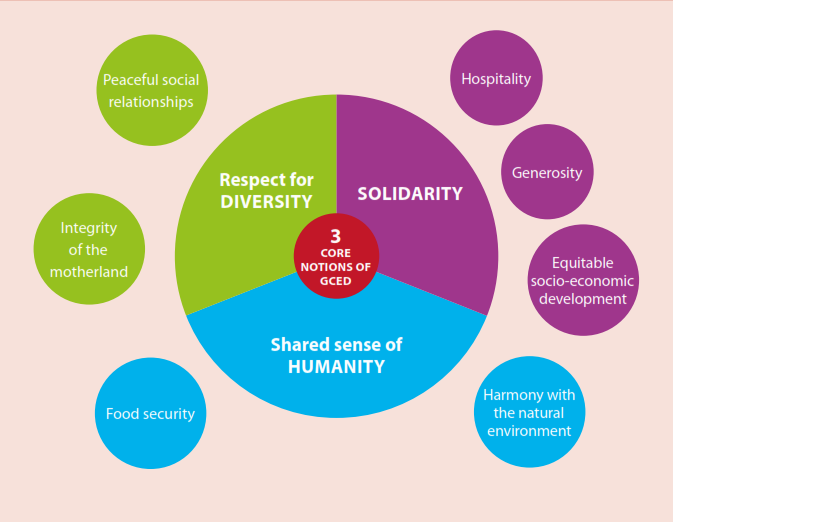
The aims of GCED are for active learners of all ages to:
- know their identity and their position within a network of multiple relationships (family, friends, school, local community, country), which is the basis for understanding the global dimension of citizenship;
- understand the structures of global, national and local governance, the rights, duties and responsibilities of each citizen;
- recognise, respect and appreciate differences and multiple identities, to live in harmony with others;
- pay attention to others, especially the most vulnerable, and demonstrate empathy and compassion;
- acquire values of equity and social justice, as well as skills to critically analyse inequalities linked to gender, socio-economic situation, culture, religion and age;
- acquire an acute awareness, a rigorous moral sense and critical thinking skills that can be constructively transposed into their daily lives;
- acquire the capacity to make decisions, to use the methods and tools of problem solving, mediation, negotiation, collaboration, dialogue and peace building;
- familiarise themselves with ethical issues: biodiversity, climate change, consumerism, fair trade, migration, poverty and wealth, sustainable development, terrorism, war, etc.;
- reflect on the general impact of their choices and decisions, engage in civic action, social entrepreneurship, active participation, taking personal and social responsibilities.
GCED has a lifelong learning perspective, beginning in early childhood and continuing through each level of education into adulthood. It requires formal and informal approaches, interventions covering both educational programs and extracurricular activities, conventional and unconventional methods to encourage wide participation of learners. Learning topics should be practical, appropriate to the age of the learners, as well as to diverse geographic and socio-cultural contexts.
In recent years , two Forums on Global Citizenship Learning have been organised by UNESCO. Research, consultations and experimentations have been carried out on the ground by education actors in different regions of the world .
It emerges now that in order to achieve the targeted objectives, GCED must adopt a multidimensional approach based on three areas of learning :
>>> Cognitive learning : Getting to know, understand and critically judge global, regional, national and local issues, as well as the interconnectedness and interdependence between different countries and peoples.
>>> Socio-emotional learning : Having a feeling of belonging to a common humanity, of sharing values and responsibilities, empathy, solidarity and respect for differences and diversity.
>>> Behavioural learning : Acting effectively and responsibly locally, nationally and globally to foster world peace and sustainability.
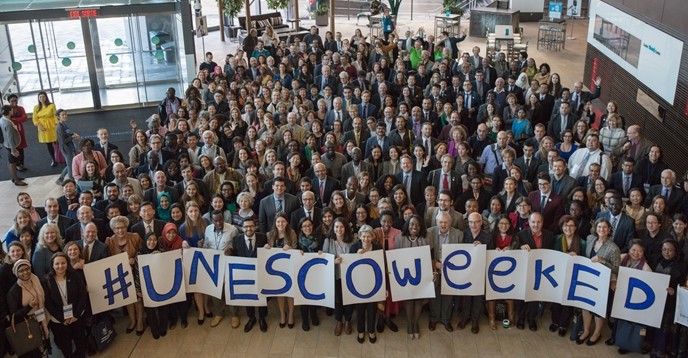
Photo courtesy of UNESCO, from the Forum on Global Citizenship Learning.
Education has the power to make a difference. It helps shape the values of future generations. We all know that adolescence is a crucial developmental period, during which identity, belonging and socialisation – especially among peers – are particularly important. Schools therefore play a major role in the socialisation of young people, their development, the construction of their ideas and their conception of justice, democracy and human rights. Teachers are usually the main actor in this work and have a decisive influence, along with families, on the attitudes and behaviours of young people.
GCED is a major subject in our societies today. It must help ensure that future generations are made up not only of critically-minded citizens, but also of enlightened and autonomous actors, prepared to build peaceful, just and inclusive societies.”
LIKE WHAT YOU'VE READ? SHARE IT WITH YOUR FRIENDS
Very informative and relevant, exactly what I was searching for. Thanks
Thanks for great information.
Leave a reply Cancel reply
Your email address will not be published. Required fields are marked *
GLOBAL VOICE SIGN-UP
Subscribe to receive the Soroptimist International Newsletter by email.

- WWGS Management, Governance & Privacy Policy
- Vacancies – Not available
- Values and Attitudes
- Taking Action
- Methodologies
- About Award
- Global Passport Resources
- Apply for Grant Funding
- Reporting on your Grant Funding
- Spending your Grant
- Who Can Apply
- Grantee Forms
- School Support
- Organisation Support
- 6-Step Programme
- Resource Library
- Training and Events
- Training Resources
- Workshop Providers
- Case Studies
- Self-Assessment Tool
- Instructional Videos
Global Citizenship Education
What is global citizenship education.
Global Citizenship Education (GCE) is an educational process aimed at increasing awareness and understanding of the rapidly changing, interdependent and unequal world in which we live. By challenging stereotypes and encouraging independent thinking, GCE helps students critically explore the root causes of global justice issues and how they interlink with our everyday lives.
GCE inspires global solidarity by supporting people to fully realise their rights, responsibilities and potential as global citizens in order to take meaningful action for a just and sustainable world. More on the definition of Global Citizenship Education.
Global Citizenship Education:
- Is about teaching and learning through a global justice lens
- Allows students to explore the knowledge, skills, attitudes and values necessary to become global citizens
- Cultivates the key skills at Junior and Senior Cycle
- Facilitates students to take action for a more just and sustainable world
Global Citizenship Education is not:
- Only about far away places and peoples
- Fundraising
- Just a focus for a particular day or week
- Just about the environment
GCE at a Glance
GCE involves engaging our Head, Heart and Hands. Therefore Global Citizenship Education has 5 key components;
Q&A: Why digital global citizenship education is essential
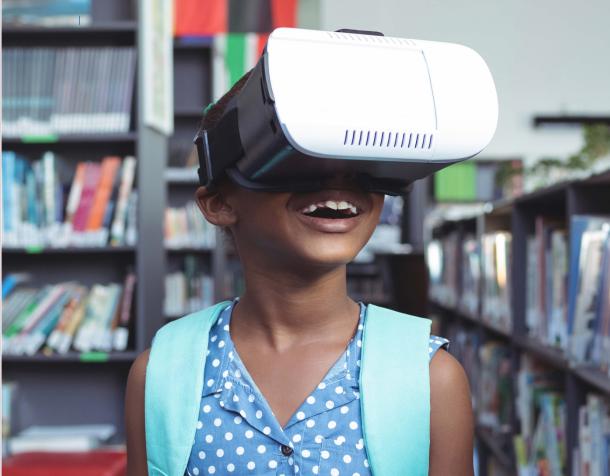
As the world celebrates the first International Day for Digital Learning on 19 March, here is what you need to know about UNESCO’s recent latest publication - Global citizenship education in a digital age: Teacher guidelines
Why is digital global citizenship important?
In 2023, 79% of world’s youth between the age of 15-24 were using the internet. The role of education, especially through global and digital citizenship, has become increasingly vital. It has the power to equip all learners, especially the youngest ones, with the skills and competencies to effectively access, critically engage with, create, use and share information and knowledge on and through diverse digital technologies, in particular social media platforms. Tools like UNESCO’s new guidelines for teachers are essential to provide a comprehensive framework for fostering global citizenship through digital literacy. This ensures learners can thrive in this interconnected digital environment.
Global Citizenship Education (GCED) is a strategic component of UNESCO’s work in education that builds upon the groundwork laid by peace and human rights education, with the aim of nurturing in learners the skills, competencies, values, mindsets and attitudes necessary for responsible global citizenship, including the fostering of criticality, creativity, innovation, common humanity and an unwavering dedication to peace, human rights and sustainable development.
Digital citizenship education, a central element of GCED, emphasizes the knowledge, skills and attitudes necessary to responsibly navigate the digital sphere. By integrating digital citizenship, media and information literacy, and ethics, this publication seeks to prepare learners to contribute constructively to digital communities globally.
How are the new guidelines useful for educators?
The guidelines emphasize the importance of ensuring all learners have inclusive access to technology and information, which is vital for their development as responsible digital citizens. This approach acknowledges complexities around the digital divide, emphasizing the necessity of inclusive education that bridges gaps and promotes equitable technology access. By growing skills in areas like critical thinking, ethical decisions and creative problem-solving, the guide aims to shape learners into responsible citizens capable of advancing a more peaceful, just and sustainable world. The guidelines offer a comprehensive collection of lesson plans, modules and teaching strategies to engage learners and reinforce global digital citizenship competencies. These resources encourage participation in both physical and digital spaces, with an emphasis on addressing global challenges through the Sustainable Development Goals. Highlighting new teaching roles and responsibilities, the guide provides valuable insights for effectively adapting methods to incorporate technological tools. This fosters student growth in communication, creativity and innovation. For educators navigating this digital terrain, the guidelines serve as a key resource for leveraging technology’s potential to enrich learning and prepare students to engage as responsible global citizens in the physical and digital world.
- Read the publication: Global citizenship education in a digital age: Teacher guidelines
- Join the webinar organized for the International Day for Digital Learning (19 March)
- UNESCO’s work in global citizenship and peace education
- More on International Day for Digital Learning
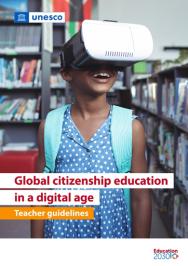
Related items
- Artificial intelligence
- Civic education
- Educational technology
- International Day for Digital Learning
- Digital learning week
- Topics: Display
- See more add

Other recent news
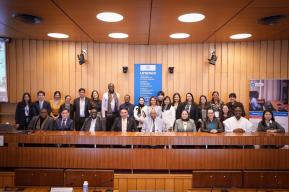
News Summit on AI and the media: UNESCO in partnership with the AUB calls on the African media to seize technological advances 2 April 2024

IMAGES
VIDEO
COMMENTS
Global Citizenship Education provides a lens to view issues and challenges through, what we at the Global Citizenship Foundation call as "Two-Systems Thinking". Where you "Think and Act, both global and local" instead of just "Thinking Global and Acting Local". Global Citizenship Education aims to instill in learners the values ...
What UNESCO does in global citizenship education. UNESCO works with countries to improve and rewire their education systems so that they support creativity, innovation and commitment to peace, human rights and sustainable development. Provides a big-picture vision for an education that learners of all ages need to survive and thrive in the 21 ...
Global citizenship education (GCED) looks into these elements to support learners of all ages to become ethical, empathetic and respectful human beings who can adapt to the world rapidly moving forward, even amidst its most complex challenges and threats. UNESCO is advancing GCED across subjects and in all spheres of life to provide them with ...
In this way, global citizenship education grounds learning in practical life situations, creates a culture of global knowledge about other societies thus instilling tolerance and challenging ...
Global citizenship education (GCED) is a form of civic learning that involves students' active participation in projects that address global issues of a social, political, economic, or environmental nature. The two main elements of GCE are 'global consciousness'; the moral or ethical aspect of global issues, and 'global competencies', or skills meant to enable learners to participate in ...
This publication, titled Global Citizenship Education: Topics and learning objectives, is the first pedagogical guidance from UNESCO on global citizenship education. It is the result of an extensive research and consultation process with experts from different parts of the world. This guidance draws on the UNESCO publication Global Citizenship ...
Global citizenship education: topics and learning objectives. p.25. The curriculum guidance document further specifies the learning objectives to be attained under each of these topics, at each level of the basic education system (from pre-primary to upper secondary), and details the key themes to be covered at each level. ...
UNESCO has just launched its new publication on Global Citizenship Education (GCED) titled Global Citizenship Education: Topics and Learning Objectives. This is the first pedagogical guidance on GCED produced by UNESCO in an effort to help Member States integrate GCED in their education systems, formal and non-formal. The guidance, presented ...
Preface. In the context of multiple globalizations, the Global Education First Initiative (GEFI) launched in 2012 by the UN Secretary Ban Ki-moon, predicates global citizenship education as a solution to enhance global peace, improve the sustainability of the planet, and bolster the defense of global commons. The first section discusses the phenomena of globalization and the proposal of the ...
A8. Global citizenship education is being advocated as one of the useful tools to prevent violent extremism. By definition, violent extremism does not tolerate diversity or difference of points of view. By contrast, one of the fundamental principles of global citizenship and global citizenship education is the respect for diversity.
Global Citizenship Education (GCED) aims to empower learners of all ages to assume active roles, both locally and globally, in building more peaceful, tolerant, inclusive and secure societies. GCED is based on the three domains of learning - cognitive, socio-emotional and behavioural: Cognitive: knowledge and thinking skills necessary to better ...
Introduction For UNESCO, Global Citizenship Education (GCED) is an educational approach that nurtures respect and solidarity in learners in order to build a sense of belonging to a common humanity and help them become responsible and active global citizens in building inclusive and peaceful societies. GCED, combined with Education for ...
It explores it from the lens of global citizenship education (GCE) as one of the possible value-creating outcomes of internationalization—in this perspective, we concur with Yemini's (2016: 184) recent posit that "internationalization be defined as the process of encouraging integration of multicultural, multilingual and global dimensions ...
Global citizenship is the umbrella term for social, political, environmental, and economic actions of globally minded individuals and communities on a worldwide scale. The term can refer to the ...
Education for global citizenship is one means to help young people develop the knowledge, skills, behaviors, attitudes, and values to engage in effective individual and collective action at their ...
What we do. Global citizenship is the term for social, environmental, and economic actions of individuals and communities who recognise that every person is a citizen of the world. It is about how decisions in one part of the planet can affect people living in a different part of it, and about how we all share a common humanity and are of equal ...
Working to attain these attributes helps to produce responsible global citizens. To help ensure that GCED is integrated in education systems and featured in the future global agenda for education beyond 2015, UNESCO is organizing the Second Forum on Global Citizenship Education (Paris Headquarters, 28-30 Jan 2015) GCED is about more than simply ...
Global Citizenship Definition. While it may mean different things to different people, the most common global citizenship definition is the idea that all people have civic responsibilities to the world as a whole, rather than just their local communities or countries. So, by expanding one's personal horizons through global learning, you are ...
Global Citizenship Education (GCED) is UNESCO's response to these challenges. GCED is a form of civic learning, which aims to impart the knowledge, skills, values and attitudes necessary to help promoting tolerance, equity and peace in the world. This feeling of global citizenship emphasises political, economic, social, cultural ...
Global citizenship is a form of transnationality, specifically the idea that one's identity transcends geography or political borders and that responsibilities or rights are derived from membership in a broader global class of "humanity".This does not mean that such a person denounces or waives their nationality or other, more local identities, but that such identities are given "second place ...
Global Citizenship Education (GCE) is an educational process aimed at increasing awareness and understanding of the rapidly changing, interdependent and unequal world in which we live. By challenging stereotypes and encouraging independent thinking, GCE helps students critically explore the root causes of global justice issues and how they ...
The role of education, especially through global and digital citizenship, has become increasingly vital. It has the power to equip all learners, especially the youngest ones, with the skills and competencies to effectively access, critically engage with, create, use and share information and knowledge on and through diverse digital technologies ...
Environmental sustainability is a complex topic and an element of our Global Citizenship Model that emerged from CIS research in 2022. We turned to our member schools and universities to learn from their innovative sustainability practices; where to start, how to overcome challenges, and expand our learning. In working with hundreds of schools ...
Background: Increasingly incorporated into curricula worldwide, Global Citizenship Education (GCE) is a complex and evolving area of education. As the significance of GCE in the classroom grows, so does the need for insight into professional development for GCE educators. Given that many approaches to GCE have typically stemmed from 'global North' contexts, it is particularly important to ...